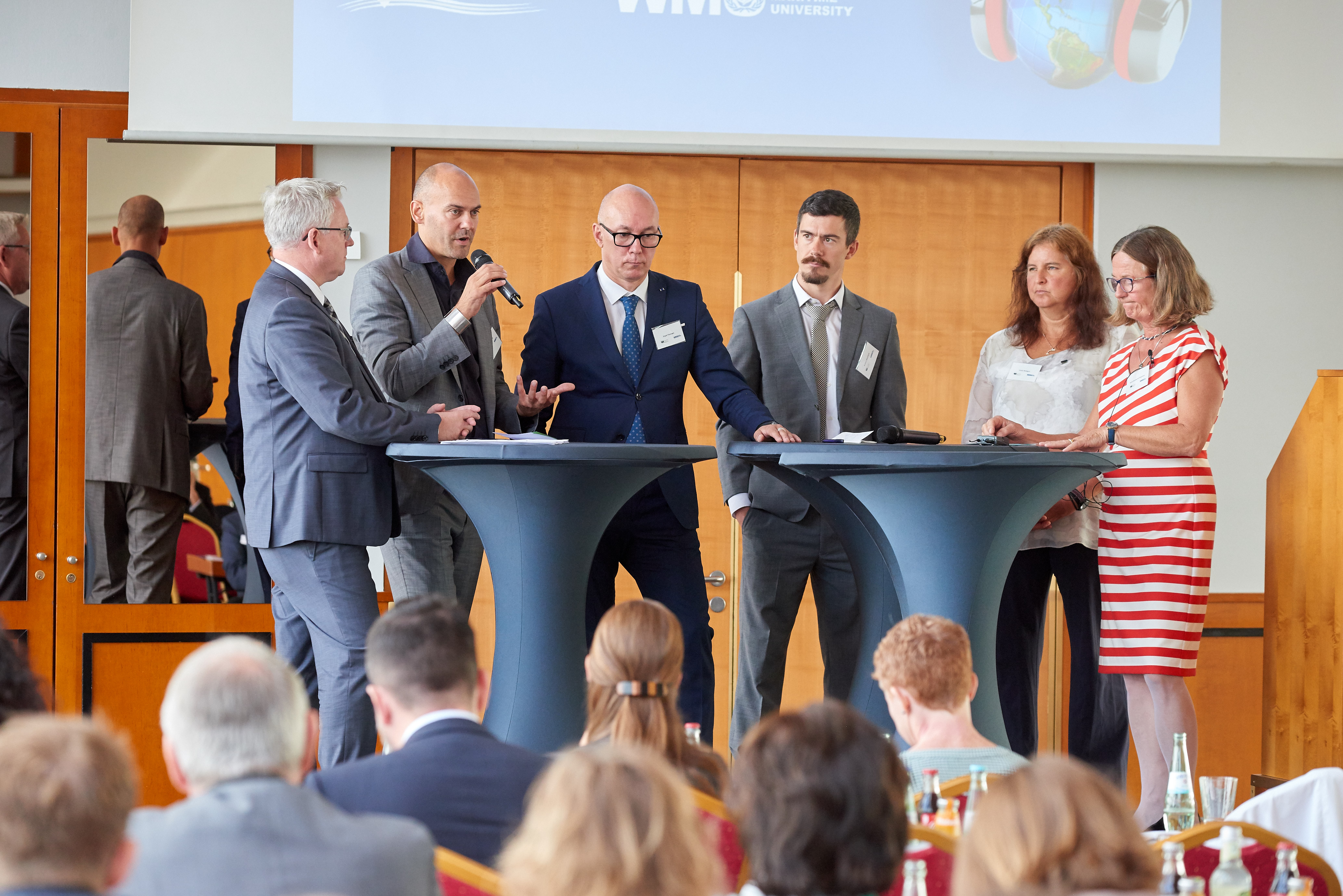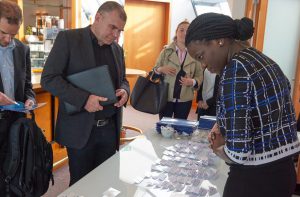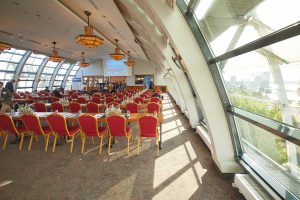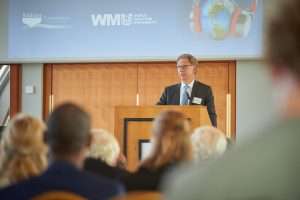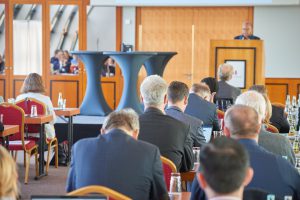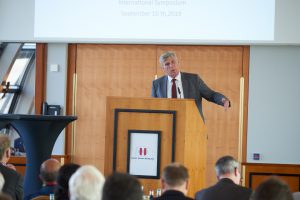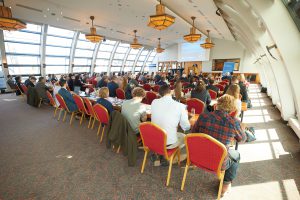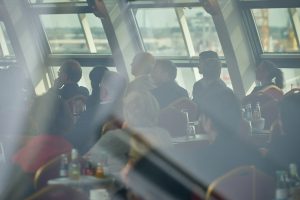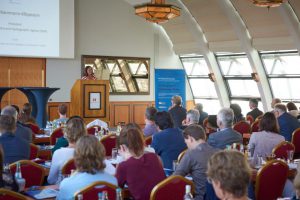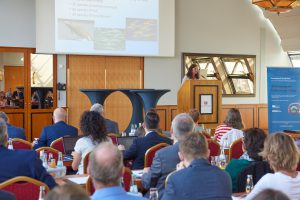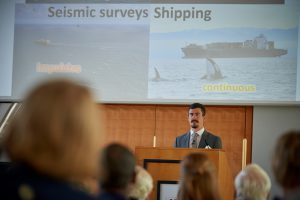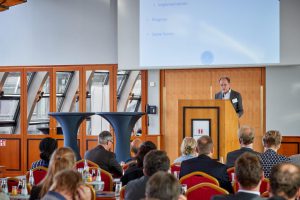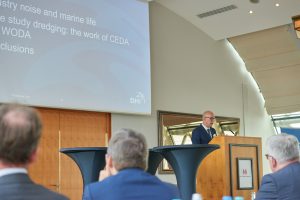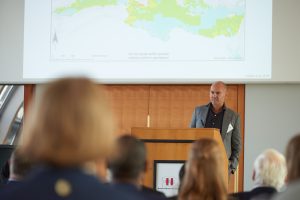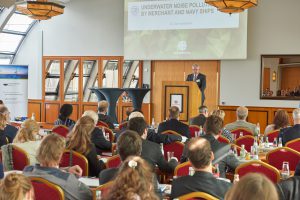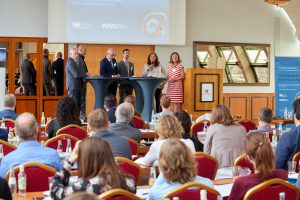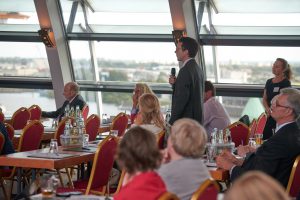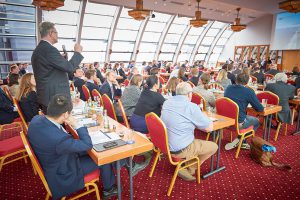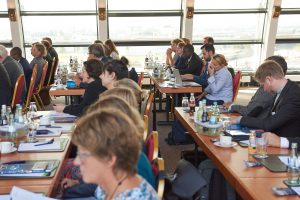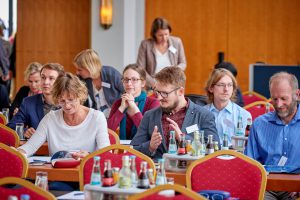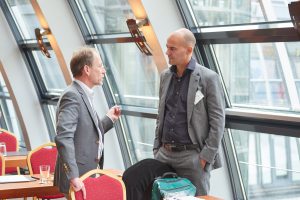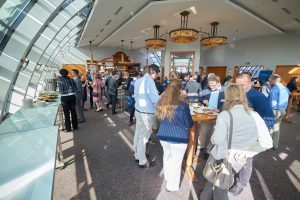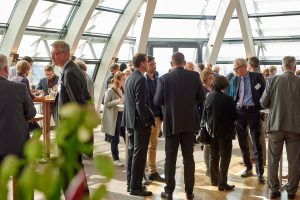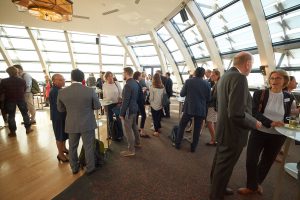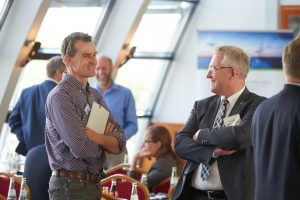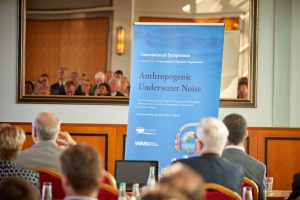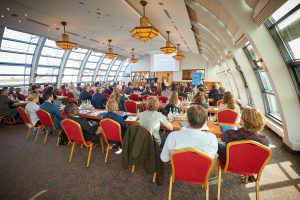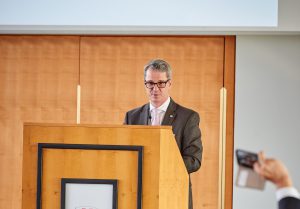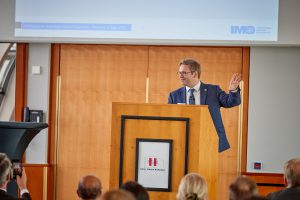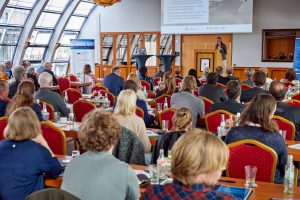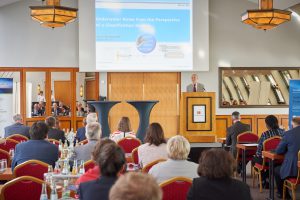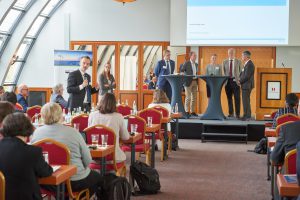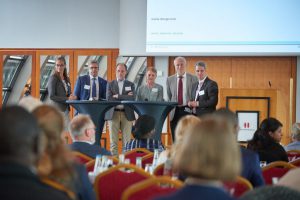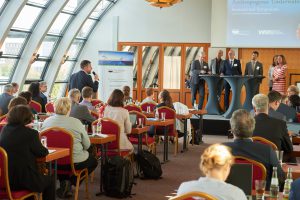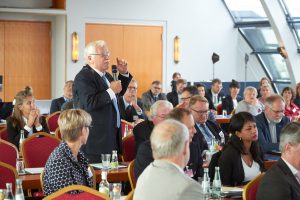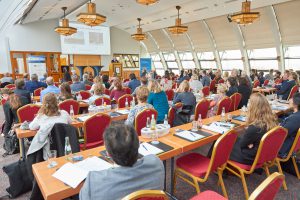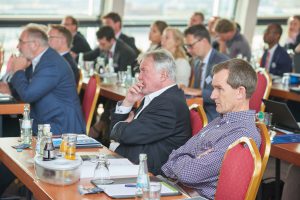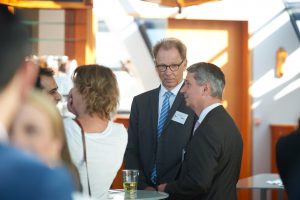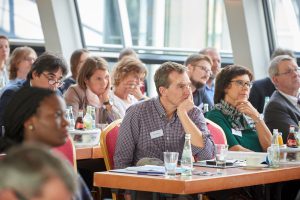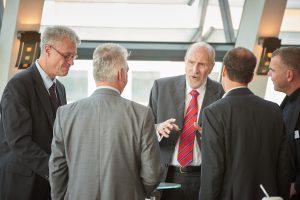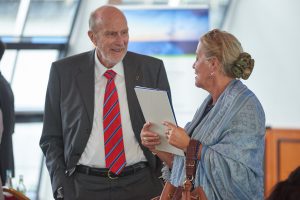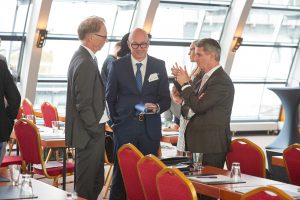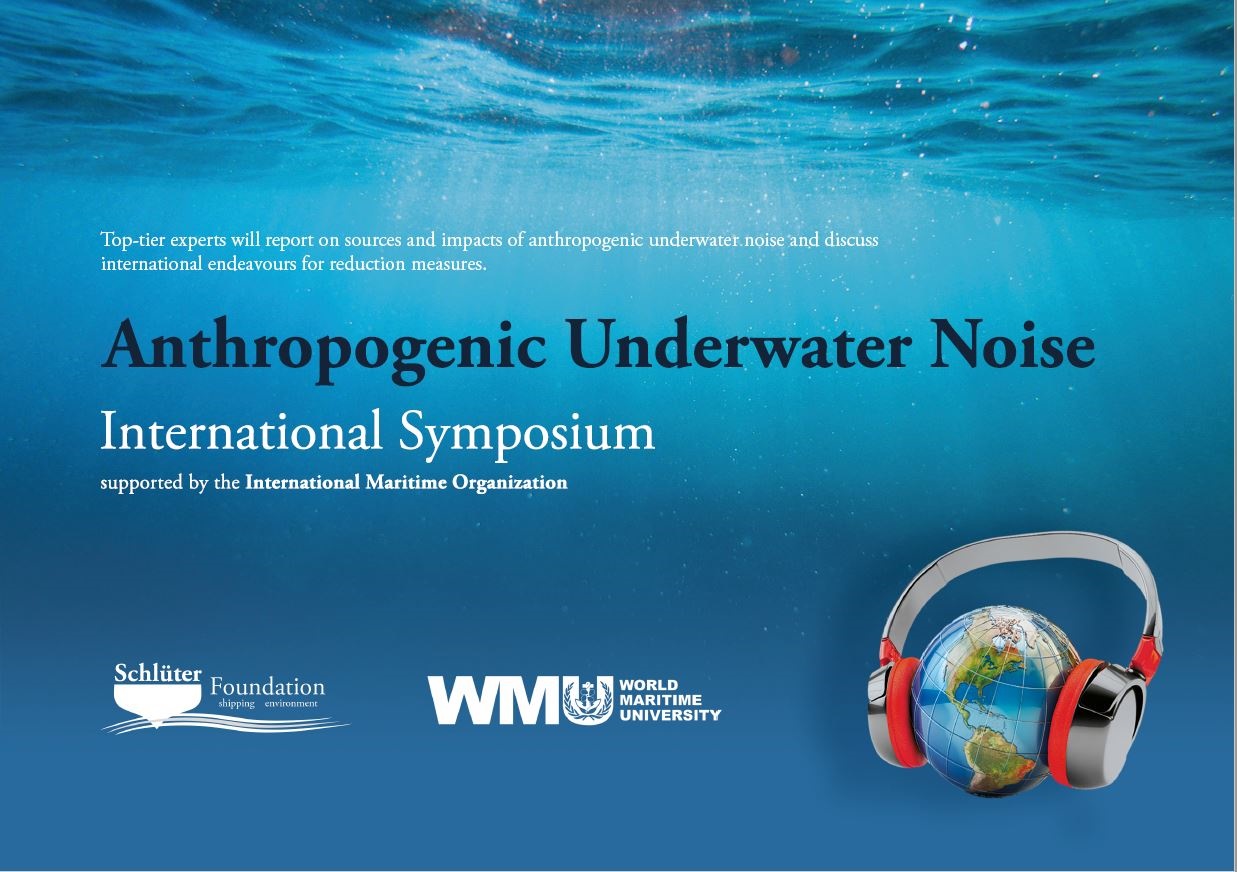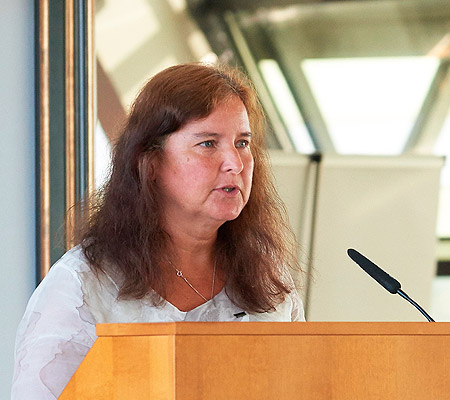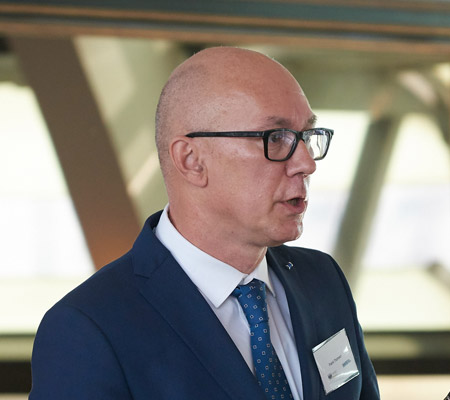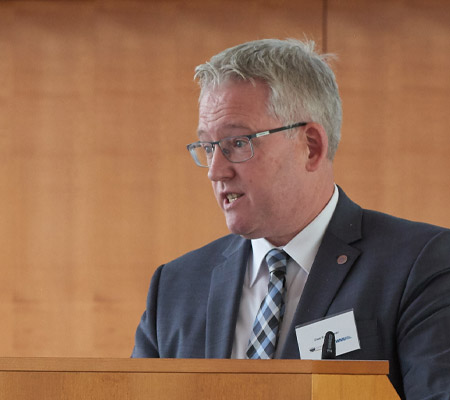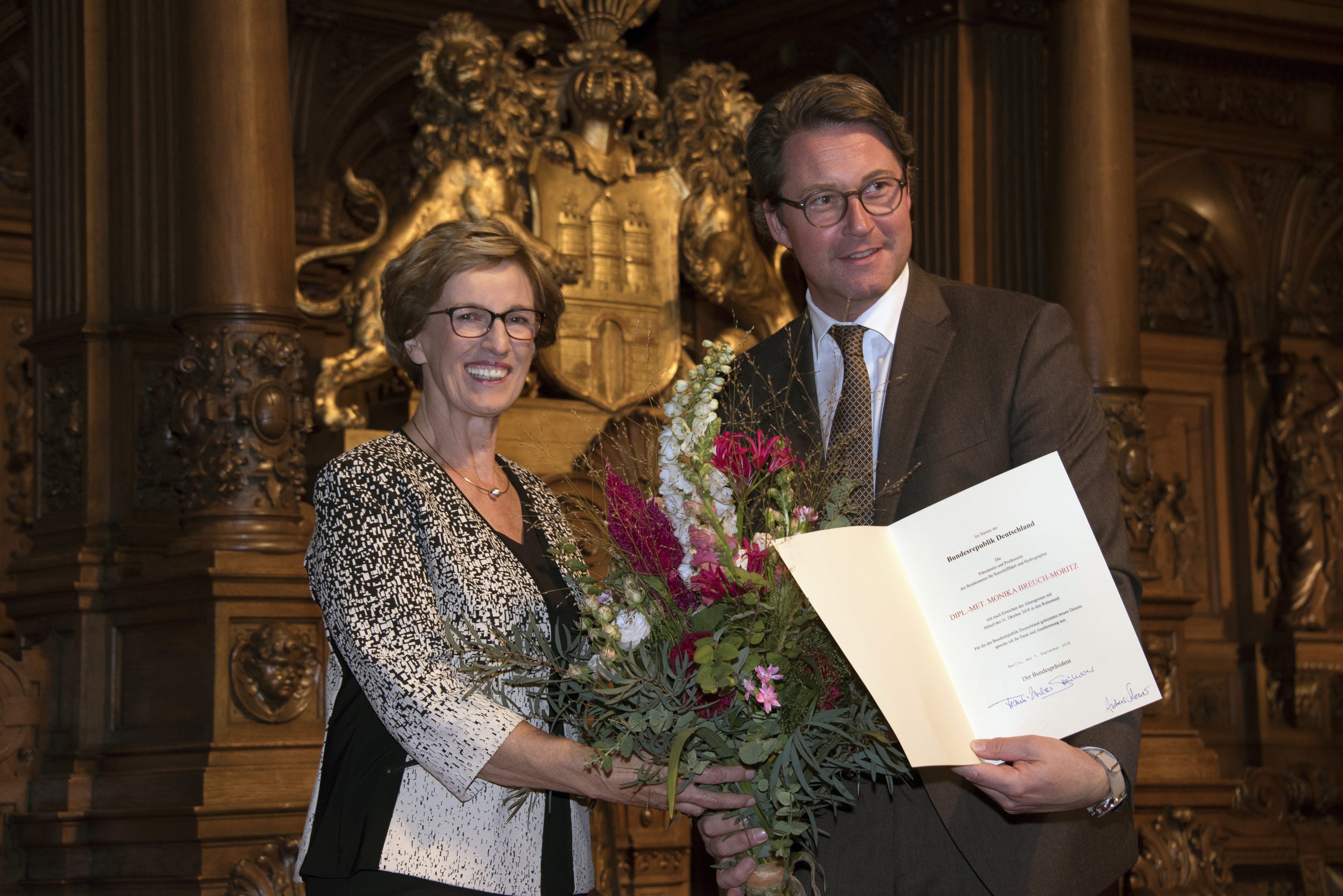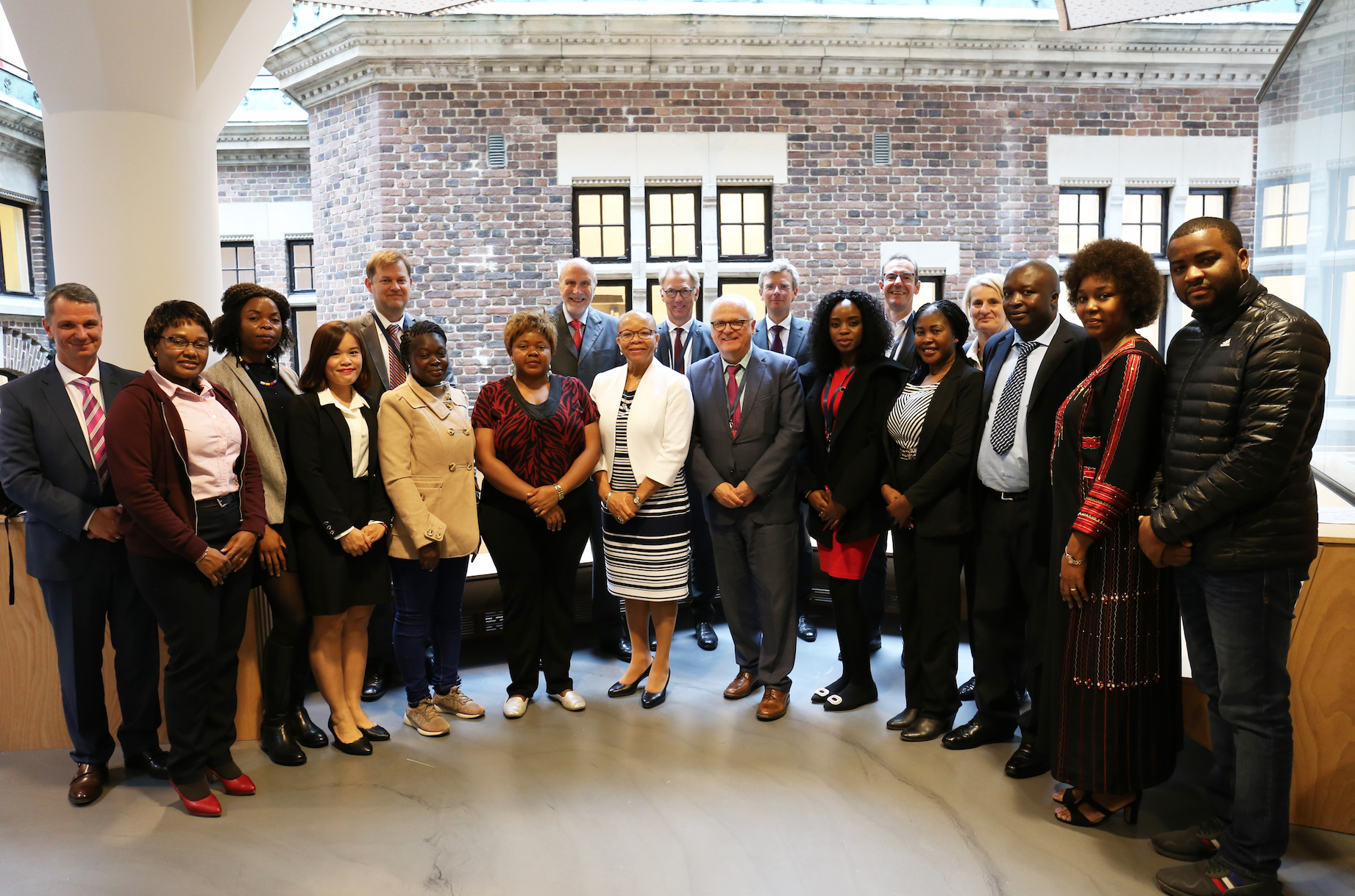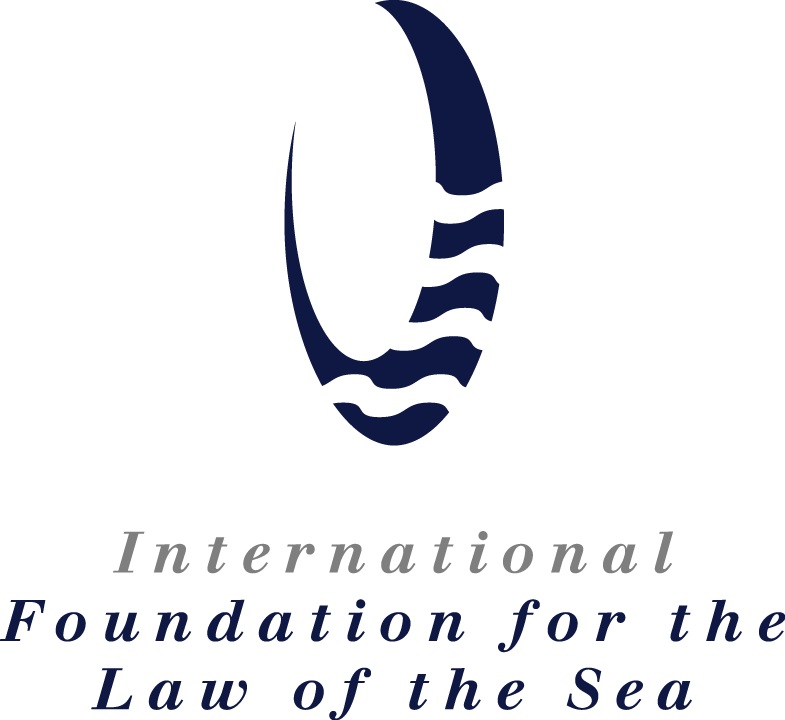Beitrag vom 6. Dezember 2019
Anthropogenic Underwater Noise – Internationales Symposium
Am 10. September 2019 veranstaltete die Jens-Peter und Betsy Schlüter-Stiftung für Schifffahrt und Umweltschutz zusammen mit der World Maritime University (WMU), Malmö, und mit Unterstützung der Internationalen Seeschifffahrtsorganisation (IMO) in Hamburg ein internationales Symposium zum Thema Unterwasserschall.
Zwölf hochkarätige Referenten aus Europa und Kanada informierten die anwesenden Experten und Interessierten aus Wirtschaft, Verbänden, Wissenschaft, Verwaltung und internationalen Organisationen über den gegenwärtigen Erkenntnisstand zu dem Thema und diskutierten mit den Teilnehmern, wie die in diesem Zusammenhang auftretenden Probleme gelöst werden können.
Fest steht, dass Unterwasserlärm eine nicht zu unterschätzende Gefahr für die Meeresumwelt darstellt. Ungeachtet eventuell bestehender wissenschaftlicher Unklarheiten in Einzelfragen sind in Anwendung des Vorsorgeprinzips Reduzierungsmaßnahmen dringend erforderlich. Auf internationaler Ebene ist man sich der Problematik des anthropogenen Unterwasserschalls inzwischen bewusst. Im Rahmen der Nachhaltigkeitsdiskussionen haben die Vereinten Nationen das Thema aufgegriffen, genauso wie die IMO und die Welternährungsorganisation. Auch in der EU und den regionalen Meeresumweltkommissionen steht es auf der Tagesordnung.
Hier kommen Sie zu den Referenten und Vorträgen des Symposiums.
Nachfolgend finden Sie einige Fotos des Symposiums:
Beitrag vom 3. Dezember 2019
Anthropogenic Underwater Noise – Internationales Symposium
Am 10. September 2019 veranstaltete die Jens-Peter und Betsy Schlüter-Stiftung für Schifffahrt und Umweltschutz zusammen mit der World Maritime University (WMU), Malmö, und mit Unterstützung der Internationalen Seeschifffahrtsorganisation (IMO) in Hamburg ein internationales Symposium zum Thema Unterwasserschall.
Nachfolgend finden Sie die Vorträge des Symposiums:
The Impact of Human-Caused Ocean Noise on Marine Animals
Lindy Weilgart, Ocean Policy Consultant, OceanCare & Adjunct Professor, Department of Biology, Dalhousie University
Mehr anzeigen
Most marine animals use sound for most or all of their vital functions. Noise impacts have been documented in at least 130 marine species. This presentation identifies and explains the various impacts on marine mammal, fish and invertebrate species and makes clear that once the population biology and ecology are impacted, it is clear fisheries and even food security for humans are also affected.
Download Präsentation (pdf)
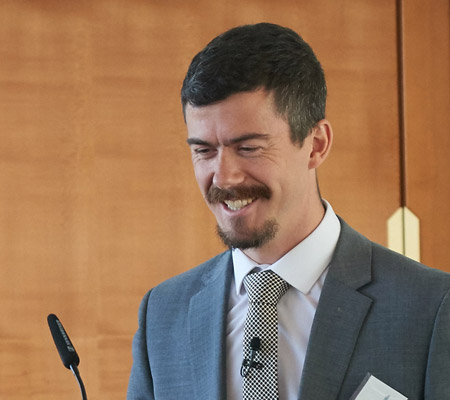
Experiences from the North-East Atlantic
Nathan Merchant, Principal Scientist and Noise and Bioacoustics Team Leader, Centre for Environment, Fisheries and Aquaculture Science (Cefas)
Mehr anzeigen
Countries in the North-East Atlantic coordinate marine environmental policy through the OSPAR Convention. Since 2015, OSPAR has been monitoring sources of anthropogenic impulsive sound in its waters via a regional noise registry. This reporting system is the first initiative to monitor impulsive noise at an international scale, and forms the basis of the OSPAR Common Indicator for anthropogenic impulsive sound. Data from the first three years of monitoring will be presented, and patterns of activity linked to wider trends in relevant industries (e.g. oil and gas, offshore wind). Ongoing work to establish an indicator for the impact of impulsive noise on key species will also be described. To monitor underwater noise pollution from shipping, two international joint monitoring projects are underway within the OSPAR area: JONAS and JOMOPANS. These projects will lay the foundation of an OSPAR-wide monitoring programme for continuous anthropogenic noise pollution.
Download Präsentation (pdf)
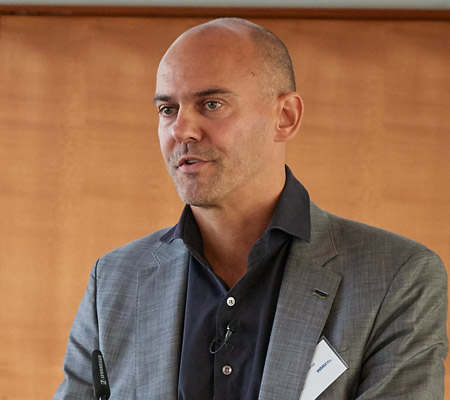
Noise Hot Spot Mediterranean Sea - Sources and Challenges
Nicolas Entrup, Ocean Policy Expert, OceanCare
Mehr anzeigen
The Mediterranean Sea has disproportionate importance as a major reservoir of marine and coastal biodiversity, containing 28% endemic species and representing 7.5% of the world’s marine fauna, and 18% of its marine flora. But also the Mediterranean Region is also home to 480 million people which human activities pose severe pressure on the marine wildlife and their habitat.
Besides other causes of individual and cumulative impacts to all marine wildlife in the region, ocean noise is a core threat marine wildlife faces in the oceans today. It has been recognized by the EU’s Marine Strategy Framework Directive as one of the 11 descriptors agreed which the Member States have committed to address and manage to reach a „Good Environmental Status“ (GES) for the region.
This presentation explores recent examples of noise generating activities in the Mediterranean Sea of concern and subsequent consequences and challenges, both in the political arena and from a management perspective. Noting that ocean noise is a transboundary pollutant with adverse impacts on wildlife across boundaries, it poses specific challenges surrounding the management of marine protected areas as well as how national authorities engage in appropriate consultation and assessment processes of individual projects with neighbouring States. A brief reality check will look into decisions adopted by Range States within international and regional Agreements and how they are applied in practise, concluding with the identification of the core challenges ahead.
Download Präsentation (pdf)
The Role of Industry in Managing the Impacts of Underwater Noise on Marine Life
Frank Thomsen, Senior Marine Scientist, DHI A/S
Mehr anzeigen
Marine industries such as shipping, oil and gas exploration, renewables, construction and dredging emit noise into the marine environment. This noise can affect marine life in several ways. Industry can – and in many cases, this is already taking place – play an active role in protecting marine life.
For example, industry plays a role in disseminating information on anthropogenic underwater noise and guideline documents via sectoral or even cross-sectoral associations. Examples are the CEDA position paper ‘Underwater Sound in Relation to dredging’ (2011) and its successor the WODA Technical Guidance on Underwater Sound in Relation to Dredging (2013). Both papers were compiled by Expert Groups comprising biologists, acousticians and industry practitioners and are introduced within this presentation.
Download Präsentation (pdf)
Underwater Noise Pollution by Merchant and Navy Ships
Uwe Kretschmer, Head of Maritime Research, Bundeswehr Technical Centre for Ships and Naval Weapons, Maritime Technology and Research
Mehr anzeigen
Anthropogenic underwater noise produced by ships influences the maritime environment. The amount is depending on the number of ships, their distribution, the underwater propagation conditions and, in particular, the radiated ship noise. In comparison with merchant ships Navy ships have different requirements, especially in regard of their acoustic underwater signature. The bottom line is that Navy ships are in general (noticeably) quieter than merchant ships. This presentation introduces sources of ship noise, gives examples of loud and quiet ships and presents measures to reduce the radiated noise of a ship. Some measures may be also applicable to merchant ship designs.
Download Präsentation (pdf)
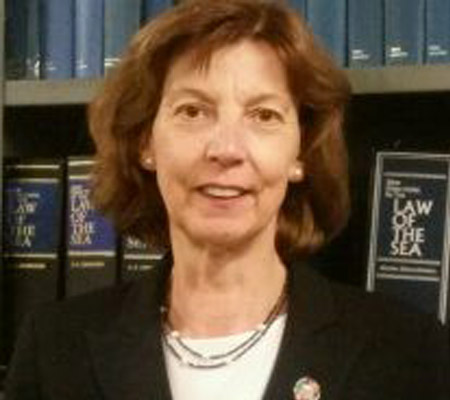
The United Nations General Assembly’s Consideration of Anthropogenic Underwater Noise
Gabriele Goettsche-Wanli, Director, Division for Ocean Affairs and the Law of the Sea (DOALOS)
Mehr anzeigen
Anthropogenic underwater noise has been addressed by the United Nations General Assembly in its resolutions on oceans and the law of the sea and on sustainable fisheries since 2005, but it is in its subsidiary body, the UN Open-ended Informal Consultative Process on Oceans and the Law of the Sea, that most of the discussions on the issue have taken place.
The presentation gives a brief overview of how the General Assembly resolutions on oceans and the law of the sea and on sustainable fisheries addressed anthropogenic underwater noise prior to 2018 when the nineteenth meeting of the UN Open-ended Informal Consultative on Oceans and the Law of the Sea discussed anthropogenic underwater noise in depth and also introduces the documents and adopted resolutions related to this meeting.
The implications of these developments for the application of the provisions of the 1982 United Nations Convention for the Law of the Sea are also briefly addressed.
Download Präsentation (pdf)
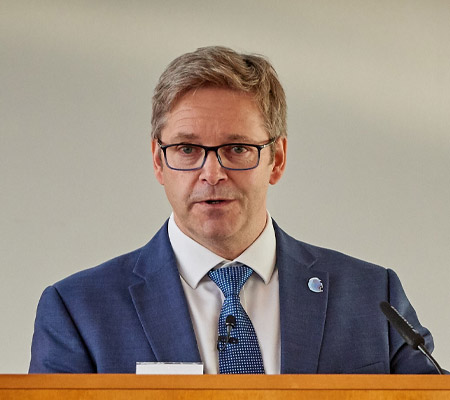
IMO and Anthropogenic Underwater Noise
Andrew Birchenough, Technical Officer, International Maritime Organization (IMO), Office for London Convention/Protocol & Ocean Affairs
Mehr anzeigen
The International Maritime Organization (IMO) is a specialized agency of the United Nations responsible for setting international regulations for safe, secure, clean and efficient shipping. Underwater noise and its impact on the marine environment is not covered by IMO regulation, however, in 2004, in response to the growing body of research that was emerging on the issue, IMO’s Marine Environment Protection Committee (MEPC) commenced discussions on the harmful impacts of underwater noise from ships on marine life.
In 2008, MEPC agreed to initiate the development of non-mandatory technical guidelines recognizing that underwater noise associated with shipping was an issue that could be mitigated and addressing concerns about its short and long-term negative impacts on marine life, especially marine mammals.
In 2014, MEPC approved Guidelines for the Reduction of Underwater Noise from Commercial Shipping to Address Adverse Impacts on Marine Life. Since the guidelines were adopted research and understanding of underwater noise emitted from commercial ships has increased and some IMO Member States are looking to prepare a new work output proposal to MEPC which will aim to address the identified policy needs related to underwater vessel noise.
The issue of underwater noise and its effects on marine life is also taken into account through IMO adopted “Particularly Sensitive Sea Areas” (PSSAs). Through the establishment of these areas, specific measures to protect the environment are applied to international shipping.
Download Präsentation (pdf)
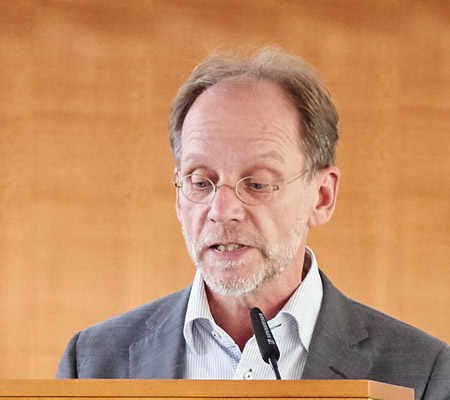
The European Marine Strategy and Underwater Noise
René Dekeling, Naval Officer, Netherlands Naval Air Service and Co-Chair of TG Noise, Expert Group of the European Commission
Mehr anzeigen
The European Marine Strategy Framework Directive (MSFD) that came into force in 2008 formally defines human-induced marine underwater noise as a pollutant.
Further cooperation between European Union member states is being achieved through the ‘Common Implementation Strategy’, and there exist dedicated working groups on methodology, data and information exchange. Emerging topics like marine litter and underwater noise have been addressed in dedicated groups.
Member states working together have made progress in implementation of monitoring of underwater sound, which was started in international joint monitoring programmes, and not at the national scale – this is relevant as neither underwater sound nor marine fauna respect national boundaries.
For impulsive noise understanding of the effects improved significantly, and measures have been defined in many member states, but international target setting for continuous noise needs further steps in conjunction with continued international cooperation.
Download Präsentation (pdf)
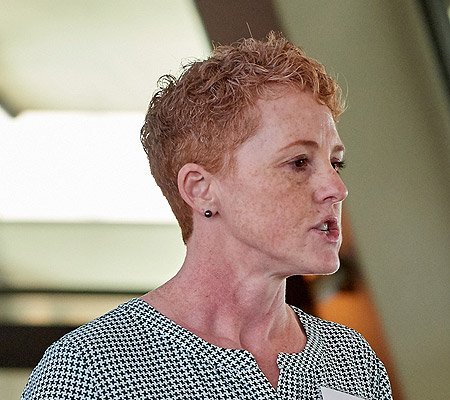
The Canadian Approach
Krista Trounce, Project Manager, Enhancing Cetacean Habitat and Observation (ECHO) Program, Vancouver Fraser Port Authority
Mehr anzeigen
Underwater vessel noise can negatively impact marine ecosystems. Since 2014, the Vancouver Fraser Port Authority-led Enhancing Cetacean Habitat and Observation (ECHO) Program, the Government of Canada and regional stakeholders have been working together to reduce the impacts of shipping noise and physical disturbance on marine ecosystems, specifically the endangered Southern Resident killer whales on the west coast of Canada.
Canada has undertaken numerous collaborative research initiatives to better understand and manage the cumulative effects of shipping activities on endangered whales in the region. This presentationprovides an overview of the ECHO Program and research which has led to the Vancouver Fraser Port Authority expanding their environmental incentive program. In addition, the presentation highlights Government of Canada initiatives to develop and implement additional measures, advance work on quiet ship design and technologies, and international engagement to reduce underwater noise for marine ecosystems in Canada and abroad.
Download Präsentation (pdf)
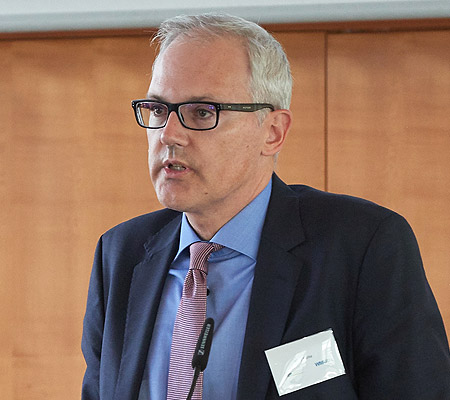
Maritime Administration Perspective
Nico Nolte, Head of Department Management of the Sea, Federal Maritime and Hydrographic Agency (BSH)
Mehr anzeigen
The Federal Maritime and Hydrographic Agency in Hamburg and Rostock is the central maritime service provider in Germany with several tasks regarding shipping, nautical hydrography, marine science as well as installations at sea. The presentation provides information how BSH as a public agency deals with the emerging issue of underwater noise. BSH is operating for several years a marine monitoring network (MARNET) which generates oceanographic data. This existing infrastructure offers unique possibilities as it could play a significant role with regard to monitoring underwater noise in the future. Besides, BSH takes part actively in the INTERREG project Joint Monitoring Programme for Ambient Noise in the North Sea (JOMOPANS). The main goals and first results will be presented. Another important task of BSH is the licensing of offshore windfarms in the Exclusive Economic Zone and the observation of construction and operation with regard to effects on the marine environment. How BSH is addressing as an administration the protection of marine mammals, which rules for noise reduction apply and how measures are taken will be explained.
Download Präsentation (pdf)
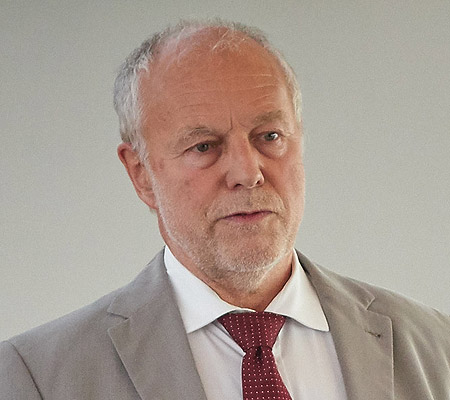
Underwater Noise from the Perspective of a Classification Society
Kai A. Abrahamsen, Senior Principal Engineer Noise & Vibration, DNV GL – Maritime
Mehr anzeigen
The main purpose of a classification society is to safeguard life, property and the environment which involves a broad range of topics. In DNV GL ship noise and vibration have been treated in various ways for more than 70 years, underwater noise has been considered the last 50 years. As a classification society DNV GL can influence and verify rules and regulations, can issue voluntary requirements to help the shipping society to treat these topics in a realistic and practical way, can act as advisors to help control noise and vibration levels and is able to build important experience in the field through verification measurements and research.
DNV GL issued in 2010, as the first classification society, requirements to noise emission for five different operational scenarios in the voluntary class notation SILENT.
The presentation explains the background for the SILENT notations, and briefly explains the main noise mechanisms and important considerations in controlling the noise radiation from ships in order to attain the different notations.
Download Präsentation (pdf)
Beitrag vom 1. November 2018
Verabschiedung unseres Kuratoriumsmitglieds Frau Monika Breuch-Moritz in den Ruhestand
Monika Breuch-Moritz mit Bundesminister Andreas Scheuer
Im Rahmen eines Empfangs des Senats der Freien und Hansestadt Hamburg wurde unser Kuratoriumsmitglied Monika Breuch-Moritz als Präsidentin des Bundesamtes für Seeschifffahrt und Hydrografie (BSH) zum 31.10.2018 in den Ruhestand verabschiedet. Ihre Nachfolgerin ist Frau Dr. Karin Kammann-Klippstein.
Sowohl der Bundesminister für Verkehr und digitale Infrastruktur Andreas Scheuer, als auch Hamburgs Senator für Wirtschaft, Verkehr und Innovation Frank Horch betonten in ihren Ansprachen den besonderen Einsatz und die besondere Kompetenz von Monika Breuch-Moritz für den maritimen Umweltschutz auf nationaler und internationaler Ebene.
Wir freuen uns sehr, dass Monika Breuch-Moritz auch nach Beendigung dieser herausragenden Amtsstellung unsere Stiftung im Kuratorium weiterhin mit großem Engagement und Tatkraft unterstützen wird.
Weitere Informationen unter:
https://www.bsh.de/SharedDocs/Pressemitteilungen/DE/Text_html/html_2018/Pressemitteilung-2018-10-23.html?nn=1651990
Beitrag vom 25. Oktober 2018
Vorstand und Kuratorium der Stiftung zu Besuch bei der der WMU in Malmö
Dr. Cleopatra Doumbia-Henry, Präsidentin der WMU, Reinhard Klingen, Ministerialdirektor für Wasserstraßen und Schifffahrt (Mitte), und die Delegation aus Deutschland (hinten) mit Prof. Schröder-Hinrichs (links) und den aktuell vom Bundesministerium für Verkehr und digitale Infrastruktur geförderten Studenten.
Unser Kuratoriumsmitglied und WMU Governor, Professor Dr. Peter Ehlers besuchte zusammen mit dem Vorsitzenden des Vorstandes unserer Stiftung Dr. Axel Henriksen die WMU in Malmö am 02.10.2018 zum offiziellen Start des aktualisierten und sanierten WMU Maritime Risk and System Safety (MaRiSa) Simulator-Labors. Die Sanierung des Labors wurde durch eine Unterstützung der Bundesregierung in Höhe von 150.000,- EUR ermöglicht. Mit in Malmö waren Reinhard Klingen, Ministerialdirektor für Wasserstraßen und Schifffahrt im Bundesministerium für Verkehr und digitale Infrastruktur sowie Professor Dirk Max Johns ( Verband Deutscher Reeder) sowie Tino Hensel und Frau Caroline Baumgärtner (Carnival Maritime). Professor Jens-Uwe Schröder-Hinrichs, Forschungsleiter der WMU und ebenfalls Mitglied unseres Kuratoriums, informierte die Delegation über die Besonderheiten des Labors, das der Universität das Potential verleiht, eine integrierte Ausbildung in den Bereichen Sicherheit, Sicherheit und Notfallplanung im Seeverkehr durchzuführen und die Forschungsaktivitäten besser zu koordinieren.
Weitere Informationen unter:
https://www.wmu.se/news/germany-furthers-support-wmu-simulator-lab-refurbishment
Beitrag vom 27. Juli 2018
Vollstipendien für die IFLOS Summer Academy
Unterstützung der 12. IFLOS Summer Academy durch Übernahme zweier Vollstipendien
Vom 22.07.-17.08.2018 findet zum 12. Mal die von der IFLOS (International Foundation for the Law of the Sea) organisierte Summer Academy am Seegerichtshof in Hamburg statt.
Es werden 42 Teilnehmerinnen und Teilnehmer aus 31 Nationen erwartet. Diesen talentierten maritimen juristischen Nachwuchskräften werden diverse Vorlesungen und ein Moot Court geboten, realisiert durch den ehrenamtlichen Einsatz von 35 international anerkannten Expertinnen und Experten.
Die Jens-Peter und Betsy Schlüter-Stiftung für Schifffahrt und Umweltschutz ermöglicht Wipada Lalitpattarakit (Thailand) und Samuel Charles Bonor (Indonesien) die Teilnahme an der Summer Academy durch die Übernahme eines Vollstipendiums.
Frau Wipada Lalitpattarakit verbindet akademische und berufliche Erfahrungen in verschiedenen Aspekten des Umweltschutzes mit der nationalen thailändischen Meerespolitik und möchte Ihre Erfahrungen in der Schifffahrt erweitern.
Herr Samuel Charles Bonor ist ein maritimer Experte, der für das Indonesian Classification Bureau arbeitet. Zu seinen Aufgaben gehört unter anderem die juristische Recherche insbesondere zu Schiffssicherheitsvorschriften und zur Entwicklung des maritimen Umweltschutzes mit dem indonesischen Verkehrsministerium.
